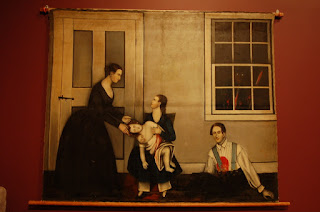PISS, PRAY, SLEEP
“The scenes are unwritten, the parts unstudied, the actors come on without notice, and often pass off in ways unexpected.” -William H. Seward in a letter to Henry Sanford 1863 Lincoln’s Indispensable Man Walter Stahr
It wasn’t only runaway ponies that were advertised in John P. Osterhout’s paper. Under the heading RUNAWAY SLAVE a smudgy, cartoonish ink illustration of a black man is running scared, looking over his shoulder, on the back page of Osterhout’s Bellville Countryman.
“Committed to the jail in Austin County, on the 23rd day of May 1861, BILL, who says he belongs to John Cotton, above Waco. Says his master bought him of Hal Runnels. He was taken up coming down the river Brazos on a raft. Bill is about 45 years old, about 5 feet 1 or 2 inches high, dark complexion, weighs from 130 to 140 pounds; several teeth out of his upper right jaw. The owner of said negro will come and prove away said slave and pay charges, otherwise he will be disposed of according to law.” -Sheriff James J. Jackson Austin County
This short notice throws a different spin on the enslaving, escape and official confinement “according to law” narrative of any black man in Texas in 1861. A slave by the name of “Bill” escaped his new master John Cotton, got caught for doing nothing more than floating down the Brazos River, and was locked up in Sheriff Jackson’s Austin County jail cell. Not wanting to feed or lodge “Bill” for free, the Sheriff posted a public notice in The Bellville Countryman, essentially ordering the slaveowner to come and pick up his property or “Bill” would be “disposed of according to law.” The law offered great discretion in the matter. The escaped slave could be forced to work for a new master (the sheriff) sold, or simply taken out back and shot. U.S. Politicians are famous for saying “we are a country of laws,” when they want to justify practices, no matter how horrific. This was the law in Texas in 1861.
The constables loaded Jack Hodges, with eight other prisoners, into the armored wagon and headed northwest into the dark. At sixty-two, almost as old as Richard Jennings when he shot him, Jack now joined the young lawyer William Henry Seward, and the toddler William Freeman, at the mouth of the Owasco River, Cayuga County, Auburn, New York. Austin Reed was still in Rochester.
Within a short time the Auburn prison chaplains realized what they had in Jack Hodges. Rev. Louis Dwight saw a guilty man already subdued, reflective, repentant, redeemed, and changed for the better—putty in his hands. This was the role of the prison chaplaincy, to mold, convince the inmate to accept his guilt and justify the length of sentence, enduring it all with resigned obedience, no matter the inhumanity of their stay. Jack was half way there. The Auburn chaplaincy would take Jack Hodges to the next level as a propagandist, entering into another, wider, conspiracy.
Thomas Eddy’s well intentioned attempts at reform at Newgate had devolved into complete unmanageable anarchy in the short time it was open. The new state prisons at Auburn and Sing-Sing would not make the same mistakes. They would invent their own sins, coming up with more convincing confessions to justify them. Silent congregate work and nightly isolation would comprise the radical Auburn System. Echoing William Coffey’s fears of contagion between the neophyte prisoner and the more seasoned criminal, Auburn identified this as one of the primary failings at Newgate, that they would avoid at all costs. By the time Jack Hodges arrived at Auburn all inmates had a private cell of their own. During workshop hours and mealtime, a strictly enforced silence policy would be instituted; all movement would be heavily regimented and controlled.
Daily routine would be simple: wake, work, eat, shit, piss, pray, sleep….repeat. Any purposeful deviation from this routine would be met with the “cat-o-nine tails” or worse.
At Auburn, movement of the unruly mass would be accomplished efficiently through a physically restricted, collective “lockstep” shuffle: head down, eyes cocked towards the guard, opposite hand on shoulder of man in front of you. No lifting yer feet. Shuffle, head down. SILENCE!
Swift and brutal reprisal with flogging or extended periods of time in solitary confinement, the Sunday Cell or stocks, were the norm at Auburn for the slightest infraction of the rules. If that didn’t work there was the showering bath, yoke, box or whatever else the keepers could dream up to inflict pain, demean, degrade, and control the wayward inmate. And if you screamed, breaking the rule of silence, you got it worse. As he’d done all his life, Jack Hodges defied the norm. For whatever reason, as other prisoners languished, were tortured and killed, Jack Hodges blossomed at Auburn State Prison, becoming a privileged, model prisoner; about to be held up to the world as proof of the benefits of mass incarceration and the Auburn System. As my stay in Seveirville County jail illustrated, I wouldn’t have lasted an hour.

Comments
Post a Comment